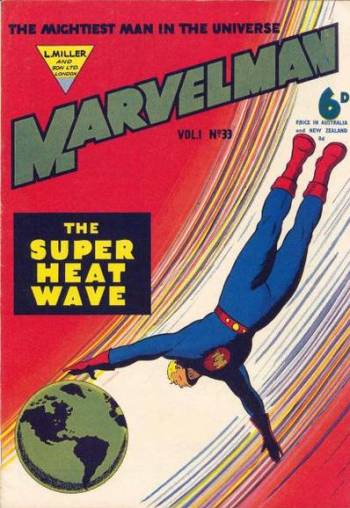
November 15, 2011
 Mick Anglo, 1916-2011
Mick Anglo, 1916-2011


Mick Anglo, a comic book writer and artist best known for the creation of the
Marvelman series,
died in late October (reportedly on Halloween). He was 95 years old.
Anglo was born Maurice Anglowitz in the East End neighborhood of Bow, in London. He received his primary education at the Central Foundation School in Islington, and art training at the John Cass Art School. He was a freelancer working in such areas as fashion illustration (to which his family was attached by trade) until the Second World War. Prefiguring his eventual peacetime career, Anglo published cartoons through an army newspaper linked to the South East Asia Command and then to a newspaper in Singapore. Anglo enlisted in 1939; he was married in 1940, which Anglo's obituary at
the Forbidden Planet International blog notes is around the time he took the shortened name now preferred by his father.
Leaving the military, Anglo split time as a writer of pulps and a maker of comic strips until the late 1940s, finally catching on with Martin and Reid in 1948. Anglo edited that line and contributed both art and writing to their various genre offerings. Anglo also produced a series of one-offs for Paget Publications, where he did the early British superhero Wonderman. In the early 1950s, Anglo moved to Arnold Book Company and then L. Miller and Son while still holding onto the writing gigs he established for himself at Martin and Reid. Anglo eventually set up shop as a packager of comic books, a job he held until the early 1960s and a period in which he gave early work to a wide variety of eventual British industry stalwarts.
Anglo created Marvelman in 1954 after Fawcett had to cut off the
Captain Marvel comics they had been doing due to losing their infamous lawsuit to DC Comics over Captain Marvel being a knock-off of Superman. Leonard Miller asked Anglo to provide a new feature to replace the now-lost and still-popular Marvel stories. Anglo came through by providing a group of characters
extremely closely related to those in the
Captain Marvel comics. By the time he left the series, Anglo had scripted 736 issues of the various Marvelman-related comics efforts. With Anglo's departure, the titles went into reprints before eventually ending.
Anglo started his own self-named imprint in the early '60s, slowly completing his shift from writing and drawing comics and into the production/packaging side of the still very low-to-the-ground business as it existed in the UK. One of the Anglo Comics offerings was
Captain Miracle, made from redrawn moments from the various Marvelman comics. By 1966,
Captain Miracle and its companion titles had all cycled out of circulation. Anglo moved to Thorpe and Porter, where he created annual-sized comics based on various popular television series. In the mid-'60s, Anglo returned to the Marvelman well for 13 issues of the stupendously similar
Miracle Man for the publisher Top Sellers. Also in 1966, Anglo spearheaded the launch of four titles from Badger Books, a company owned by the genre book publisher John Spencer & Co:
Fantasy Stories,
Macabre Stories,
Spectre Stories and
Strange Stories. They all folded within six issues. Anglo retired in the 1980s after another run on TV series-based comics (this time for City Magazines'
TV Tornado). Along the way he had diversified into joke writing, books about comics and other esoteric subjects, and even cookbooks. His last sustained comics gig was for the war titles published by Fleetway/IPC in the late 1970s and into the very early 1980s.
Anglo slipped back into the comics spotlight with the revival of his Marvelman character in the early 1980s by Alan Moore. Those books were re-titled
Miracleman for publication in North America, where starting in 1985 they further ensconced Moore as a first-tier comics talent. The comics themselves became a flagship title for indie comics publisher Eclipse, and a major signpost in the move to re-imagine superheroes in a darker way that gripped the industry in that 15-year period (and, arguably, all the years since). The series and its lead character eventually slipped into an ownership and rights fight cesspool as Eclipse faded from existence, where they stayed for several years. Not helping matters was the fact that Anglo had apparently initially created a holding company for the property, issuing shares to himself and his wife. At the same time the exact provenance of the character's creation at his initial publisher remained largely unknown, as were any subsequent deals that the publisher or even Anglo might have encouraged. In 2009, Marvel Comics purchased rights from Mick Anglo and slightly later made what I believe was a separate, additional purchase for rights to the 1980s comics series. Their intention to publish the character
was announced at that year's Comic-Con International. Whether or not this deal sticks over the long-term remains unknown, but representatives from Marvel have claimed since that they're continuing to pound through various rights issues and will eventually make the character part of their extensive library. They've already dabbled in publication, and one of those efforts featured a variant cover by Anglo.
In his later years, Anglo served as both an occasional avenue towards understanding the American-type comic book element of the burgeoning post-World War II British comics scene, and as an elder statesman able to bask a bit in the reflected glory of what creators like Alan Moore, Marc Buckingham and Neil Gaiman had accomplished with his creator, the one superhero that with so many flashes of lightning seemed to never stop being created and re-created.
posted 3:40 am PST |
Permalink
Daily Blog Archives
November 2019
October 2019
September 2019
August 2019
July 2019
Full Archives


